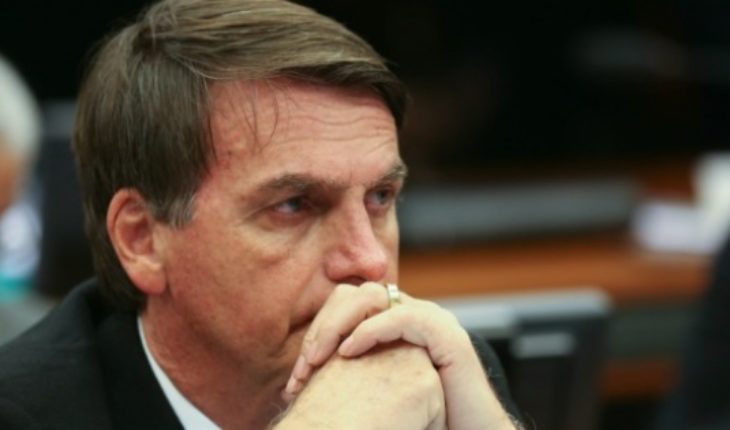to rescue Brazil from the worst economic debacle that has memory, and perhaps their worst instincts as interventionist, Jair Bolsonaro President-elect has called a prodigy of the University of Chicago and market-friendly. Your choice for Minister of Justice? Sergio Moro, of course, the federal judge who presided over the investigation of Lava Jato, the largest case of political corruption in Latin America.
Then, Bolsonaro foreign policy advisor who will be, who will guide the presumptuous former paratrooper in an uncertain world caught between a new cold war and a potentially destructive commercial conflict of treaties? Someone, please?
Yes, each new Government needed time, and much trial and error, to set her own course. However, the bellicose rhetoric of Bolsonaro has already irritated many global customers from Brazil, belittled to regional partners and antagonized key commercial partners. And there are still several weeks so it takes office.
Argentina, China and much of the Arab world: outbursts of Bolsonaro gave it a slap in the face to almost everyone.
It is true that as soon as Bolsonaro threw those grenades diplomatic, it fell back to positions more measured, almost enthusiastically global. The Paris Treaty protects a doubtful climate change? Too important to slip away, says Bolsonaro now. And what about the Chinese economic imperialists who not only wanted to buy Brazilian products, but it also “buy Brazil?” Now, all talk aims to achieve fruitful relations.
The turn toward moderation is a capitulation to reality. Consider the recent announcement by Bolsonaro that intends to assign the Ministry of Foreign Affairs to a diplomatic officer with experience, and included the three respected adviser of the World Trade Organization and former Brazilian Envoy to the Union European, José Alfredo Graça Lima.
That could be a blessing. Even if world peace does not depend exactly on the decisions made in Brasilia, Brazilian foreign policy is correct means so much to the fate of the largest economy in Latin America and the hemisphere beyond it, while neglecting traditional friends can be costly.
Despite everything that has been said to drastically change the old ways, Bolsonaro comes to the Presidency with a formidable national legacy that protect. After years of shrinkage, the oil and gas industry is expanding, and foreign drilling companies scramble to obtain stakes in promising reserves outside the country’s coast. Global demand is driving up prices of Brazilian soy, meat, and cellulose.
Brazilian exports to Islamic countries have increased by 16 percent a year since 2000, reaching US$ 4.700 million last year, according to Marcos Jank, a Brazilian expert in agribusiness.
The promise of Bolsonaro follow the leadership of Donald Trump and move the Brazilian Embassy from Tel Aviv to Jerusalem could endanger this bonanza. That became clear when Egypt abruptly canceled the State visit of the Minister of external relations of Brazil, Aloysio Nunes, last week. It is no wonder that Bolsonaro now denies that it is has taken a decision on the Embassy.
In any other aspect the economic stakes of Brazil are higher than in its relations with China. The Asian country is the largest individual investor of Brazil and best customer: purchase of everything from soybeans to mineral of iron. According to data from the Ministry of Commerce, imported nearly $30,000 million from Brazil in the first half of this year, an increase of 11 percent over the previous year. Total bilateral trade reached US$ 44,800 million in the same period, and Brazil recorded a surplus of $14.800 million.
“China is growing at twice the rate of the rest of the world and is in transition to a consumer-driven economy. That means that it will boost global demand not only food, but also manufactured products that we produce,”said the former Ambassador of Brazil in China, Luiz Augusto de Castro Neves, who heads the Brazil-China Business Council. “Offend Beijing for political reasons is to shoot you in the foot.”
Nor is is doing everything possible to achieve a correct policy with Beijing. “If Brazil wants to act strategically, should think about how partnering with China and ensuring the diversification of trade, participate in cooperative initiatives and promote industrial capacity”, said Margaret Myers of inter-American dialogue, who has studied Chinese investments in infrastructure in Latin America. “To the extent that the new Brazilian Government wants to privatise, China would have a considerable interest in investing”.
It is possible that it is soon to say that the yuan has fallen by Bolsonaro. “As Trump, he is not a normal President, so it is nonsense to think in a normal foreign policy”, said Oliver Stuenkel, Professor of international relations at the Getulio Vargas Foundation in Sao Paulo. “He was chosen as a disruptor, and will need to provide some disruption.”
Flatter Trump probably will be part of the script. Bolsonaro has never hidden his admiration for the disruptor in head of the hemisphere, and heated discussions on a joint invasion of Brazil and Colombia to Venezuela, with approval of Washington, are fueling the regional rumor.
That may be an exaggeration. The problem, according to Stuenkel, is the price that could pay Brazil policy turmoil. “With the passing of the years, Brazil forged a reputation as a country committed to strong multilateral institutions like the World Bank and the World Trade Organization and the United Nations, supporting them even when many doubted them,” said Stuenkel . “Countries react more quickly and more decisively against the Brazilians if the Government abandons this tradition.”
Not all diplomatic Bolsonaro eruptions are wrong. Behind the seemingly arrogant dismissal of Mercosur by his economic adviser, there is a widespread consensus that the poor trade pact of South America needs a transformation.
Mercosur has been affected by a detour in his goal, a negotiation without output for an agreement with the European Union and a 39 percent drop in the total trade between 2011 and 2017.
To that end, Bolsonaro can find an ally in Argentine President oriented business, Mauricio Macri, who also wants to reform the impaired Convention, encourage bilateral trade agreements outside Mercosur and put an end to the indulgence regional autocrats Bolivarian as Venezuela Nicolas Maduro.
“The economic and commercial interests should guide the foreign policy of Brazil”, said Graca Lima. “That means giving priority to the countries located in the Southern Cone of the continent, United States, China and the European Union.”
External Affairs may not be for amateurs, but nor is a “hidden science”, as Graça Lima put it.
Roberto Abdenur, Brazilian former diplomat, is in agreement. “It makes sense that Brazil is approaching the world powers away from their inclinations with the third world, and for that a Minister of Foreign Affairs experience should be chosen as soon as possible.”
The first work of the new Minister? “Educate Bolsonaro on diplomacy”. The learning curve will surely be abrupt.
This column does not necessarily reflect the opinions of the editorial board or of Bloomberg LP and their owners.
poured in this op-ed content is the sole responsibility of the author and do not necessarily reflect the editorial line nor the counter position.





